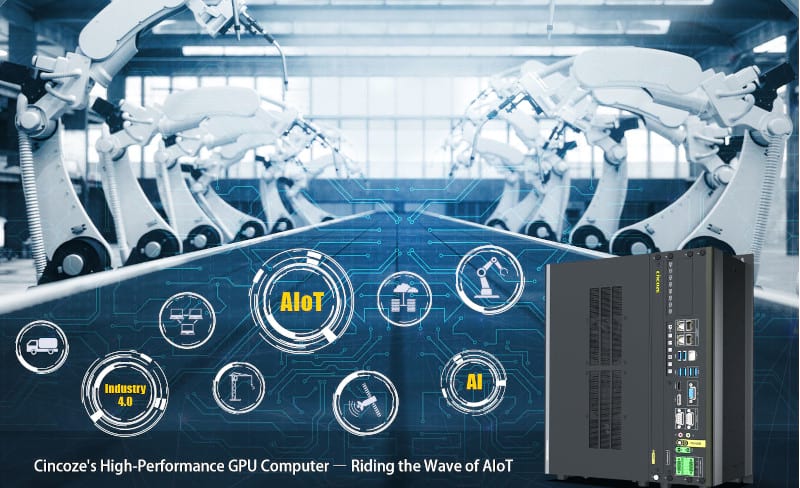Rapid evolution in AI technology is infusing IoT devices with new capabilities, leading to the new trend of AIoT. Simply speaking, IoT devices acquire data then transmit that data through the network to an integrated backend system. Typical applications include automation, remote control, and connection with other IoT devices. AIoT brings the power of AI to these IoT devices, so that machine equipment and factories can play a more active role in the process and learn intelligently.
Accumulation of data, continuous learning, and data analysis can achieve failure prevention or autonomous operation to implement a fully-fledged “smart factory.” The GP-3000 is Cincoze’s highly-acclaimed flagship model for AI and machine vision applications, combining high-end computing performance, rich high-speed I/O, and harsh environment resilience to enable edge computing in the AIoT framework. It is the first choice for effectively implementing multiple applications on the field side, such as smart manufacturing and transportation.
The Key to Smart On-Site Manufacturing
The key to rapid smart manufacturing upgrades is introducing high-efficiency GPU computers as the on-site data processing center. To that end, the GP-3000 supports an Intel Xeon®/Core™ (Coffee Lake-R & Coffee Lake) processor and sports the Intel® C246 chipset, with up to two sets of DDR4-2666 ECC/non-ECC SO-DIMMs for a maximum of 64 GB of total memory. This setup provides the coveted combination of efficient processing and parallel processing. The GPU Expansion Box (GEB) supports up to two 250W high-end full-length (≤328 mm) GPU cards to further enhance its processing capabilities. The high-speed I/O ports, with the simple addition of a camera, become the machine equipment’s eyes, allowing for the quick and accurate inspection and categorization of high-definition image inputs.
The GP-3000 includes 2x COM, 6x USB 3.2, 1x HDMI/DP/VGA, and multiple PCIe expansion slots for system expansion and connecting to various input devices to receive and transmit commands such as motion control and image capture. The high-speed GbE LAN port then shuttles the data, such as equipment utilization rate, capacity, and quality status, to the cloud and control center, allowing managers to perform resource allocation, quality control, and environmental monitoring.
Guarding the Core of Smart Transportation
Ensuring passenger safety is always the primary criterion of transportation, and AI-enhanced systems can provide advanced monitoring of drivers, vehicles, and tracks. The Cincoze GP-3000 has powerful image processing capabilities and a high-performance CPU, which can quickly detect and analyze images to increase station safety monitoring, detect driver fatigue, and monitor road and track conditions. It is the core protecting intelligent traffic safety. In addition, the GP-3000 supports desktop, face-up, wall, and rack mounting, to be installed in various car bodies or road application environments such as autonomous vehicles, in-vehicle supervision, remote signal monitoring, railway track monitoring, and railway bogie condition monitoring.
The IGN module (power ignition sensing) can monitor the on-board battery voltage and set a delayed shutdown time to avoid damage to the system due to unstable current or instantaneous flameout when the vehicle starts. In the face of severe shaking and vibrations associated with car body running or stopping, the “adjustable 3D GPU mount” exclusively designed for the GP-3000 keeps the GPU card firmly in place, even when shaken. Coupled with the three international certifications of the US military equipment inspection standard (MIL-STD-810G), E-mark, and EN 50155 (EN 50121-3-2 only), it fully demonstrates the high stability and resilience of the GP-3000.
Cincoze’s flagship GP-3000 uses all industrial-grade parts to defend against harsh environments, boasting an operating temperature range from -40℃ to 70℃. It features multiple protection systems such as overvoltage (OVP), overcurrent (OCP), and power reverse protection. Together, these features satisfy the stability, reliability, and long life cycle requirements for industrial environments, including the fields of smart factories and smart transportation.

